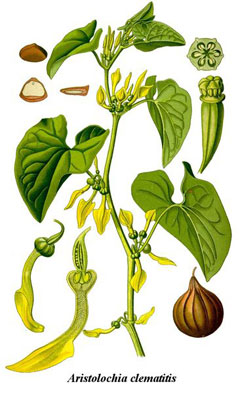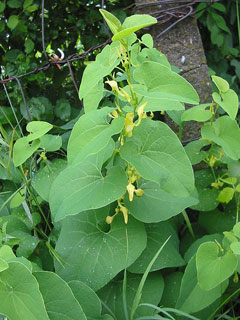 |
|
http://commons.wikimedia.org/wiki/File:Cleaned-Illustration_Aristolochia_clematitis.jpg |
 |
| http://commons.wikimedia.org/wiki/User:Bogdan |
Translate this page:
Summary
Physical Characteristics

 Aristolochia clematitis is a PERENNIAL growing to 0.7 m (2ft 4in) by 0.5 m (1ft 8in).
Aristolochia clematitis is a PERENNIAL growing to 0.7 m (2ft 4in) by 0.5 m (1ft 8in).
See above for USDA hardiness. It is hardy to UK zone 6. It is in leaf from May to November, in flower from July to September. The species is hermaphrodite (has both male and female organs) and is pollinated by Flies.
Suitable for: light (sandy), medium (loamy) and heavy (clay) soils and prefers well-drained soil. Suitable pH: mildly acid, neutral and basic (mildly alkaline) soils. It can grow in semi-shade (light woodland) or no shade. It prefers moist soil.
UK Hardiness Map
US Hardiness Map
Synonyms
Plant Habitats
Cultivated Beds;
Edible Uses
References More on Edible Uses
Medicinal Uses
Plants For A Future can not take any responsibility for any adverse effects from the use of plants. Always seek advice from a professional before using a plant medicinally.
Abortifacient Antiinflammatory Antispasmodic Diaphoretic Eczema Emmenagogue Febrifuge Oxytoxic
Stimulant
Birthwort has a very long history of medicinal use, though it has been little researched scientifically and is little used by present-day herbalists[254, 268]. It is an aromatic tonic herb that stimulates the uterus, reduces inflammation, controls bacterial infections and promotes healing[238]. The juice from the stems was used to induce childbirth[268]. The plant contains aristolochic acid which, whilst stimulating white blood cell activity and speeding the healing of wounds, is also carcinogenic and damaging to the kidneys[254]. The flowering herb, with or without the root, is abortifacient, anti-inflammatory, antispasmodic, diaphoretic, emmenagogue, febrifuge, oxytocic and stimulant[7, 9, 21, 100, 200]. Another report says that the root is used on its own[238] whilst a third says that either the fresh flowering herb or the dried rootstock can be used[268]. The plant should not be used internally without experienced supervision, externally it is used in the treatment of slow-healing cuts, eczema, infected toe and finger nails etc[9]. Use with caution, internal consumption can cause damage to the kidneys and uterine bleeding[7, 9, 21]. It should not be used by pregnant women[238].
References More on Medicinal Uses
The Bookshop: Edible Plant Books
Our Latest books on Perennial Plants For Food Forests and Permaculture Gardens in paperback or digital formats.

Edible Tropical Plants
Food Forest Plants for Hotter Conditions: 250+ Plants For Tropical Food Forests & Permaculture Gardens.
More

Edible Temperate Plants
Plants for Your Food Forest: 500 Plants for Temperate Food Forests & Permaculture Gardens.
More

More Books
PFAF have eight books available in paperback and digital formats. Browse the shop for more information.
Shop Now
Other Uses
References More on Other Uses
Cultivation details
Prefers a well-drained loamy soil, rich in organic matter, in sun or semi-shade[1, 134]. Succeeds in ordinary garden soil[134]. The plant has an invasive root system[233]. Most species in this genus have malodorous flowers, often smelling like decaying flesh[245], that are pollinated by flies[200]. The insects that pollinate this plant become trapped in the hairy throat of the flower[233]. Birthwort was formerly cultivated as a medicinal plant in most of Europe[50].
References Carbon Farming Information and Carbon Sequestration Information
Temperature Converter
Type a value in the Celsius field to convert the value to Fahrenheit:
Fahrenheit:
The PFAF Bookshop
Plants For A Future have a number of books available in paperback and digital form. Book titles include Edible Plants, Edible Perennials, Edible Trees,Edible Shrubs, Woodland Gardening, and Temperate Food Forest Plants. Our new book is Food Forest Plants For Hotter Conditions (Tropical and Sub-Tropical).
Shop Now
Plant Propagation
Seed - best sown in a greenhouse as soon as it is ripe in the autumn. Pre-soak stored seed for 48 hours in hand-hot water and surface sow in a greenhouse[134]. Germination usually takes place within 1 - 3 months at 20°c[134]. Stored seed germinates better if it is given 3 months cold stratification at 5°c[200]. When large enough to handle, prick the seedlings out into individual pots and grow them on in the greenhouse for their first winter. Plant out in late spring or early summer after the last expected frosts. Division in autumn[200]. Root cuttings in winter[200].
Other Names
If available other names are mentioned here
Native Range
TEMPERATE ASIA: Turkey, Azerbaijan, Georgia EUROPE: Denmark, Austria, Belgium, Switzerland, Czech Republic, Germany, Hungary, Netherlands, Poland, Moldova, Ukraine (incl. Krym), Albania, Bulgaria, Bosnia and Herzegovina, Greece, Croatia, Italy (incl. Sicily), North Macedonia, Montenegro, Romania, Serbia, Slovenia, Spain (n.e. & Baleares), France (incl. Corsica)
Weed Potential
Right plant wrong place. We are currently updating this section.
Please note that a plant may be invasive in one area but may not in your area so it's worth checking.
Conservation Status
IUCN Red List of Threatened Plants Status :

Growth: S = slow M = medium F = fast. Soil: L = light (sandy) M = medium H = heavy (clay). pH: A = acid N = neutral B = basic (alkaline). Shade: F = full shade S = semi-shade N = no shade. Moisture: D = dry M = Moist We = wet Wa = water.
Now available:
Food Forest Plants for Mediterranean Conditions
350+ Perennial Plants For Mediterranean and Drier Food Forests and Permaculture Gardens.
[Paperback and eBook]
This is the third in Plants For A Future's series of plant guides for food forests tailored to
specific climate zones. Following volumes on temperate and tropical ecosystems, this book focuses
on species suited to Mediterranean conditions—regions with hot, dry summers and cool, wet winters,
often facing the added challenge of climate change.
Read More
Expert comment
Author
L.
Botanical References
50200
Links / References
For a list of references used on this page please go here
Readers comment